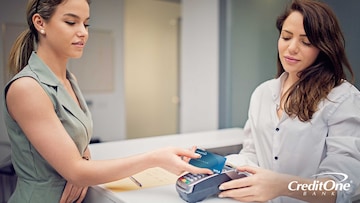
Should I Be Paying Bills With a Credit Card?
September 28, 2022
Paying bills with a credit card is a nice convenience, and sometimes nets you rewards. But this isn’t always possible, and it may or may not be the best solution available. Read on to find out when and how you can use your card.

Should I Be Paying Bills With a Credit Card?
There may be times when you’re pondering whether or not you should pay your bills with a credit card—like, for example, when you’re low on funds but still have room on your card. Or maybe your credit card offers additional rewards points or cash back for eligible purchases of internet, cable, satellite TV, and mobile phone services, and you want to maximize that.
Either way, the answer to the question, “Should I be paying bills with a credit card?” is a resounding “maybe.” Or, perhaps, “sometimes.” Let’s go into the situations where paying bills with a credit card is possible, along with the pros, cons, and factors to consider.
What Bills Can You Pay With a Credit Card?
Where there’s a will, there’s a way, and there’s usually a way to make your credit card payment work. Sometimes, it’s super easy. But other times, if you really, really want to use your credit card, you need to get creative.
Most utility bills welcome your credit card payment, so you can pay them directly without penalty or additional fee. In fact, in these instances you might even earn cash back or points rewards.
These bills include:
- Utility bills
- Mobile phone services
- Cable and satellite TV
- Internet services
- Streaming services
- Subscriptions
Pros: These bills are easy to pay with a credit card, and might earn you rewards.
Cons: If you let your credit card balance ride, you will end up paying interest rates.
Other merchants will allow your credit card payment, but they don’t prefer it, so they charge an extra “convenience fee” to offset the processing fee they pay the credit card company. Usually this is in the neighborhood of 3% or more.
These bills include:
- Taxes
- Home service providers (landscapers, gardeners, plumbers, repairmen, house painters, etc.)
- Rent
- Mortgages
- Auto loans
- Student loans
Pros: These bills are often easy to pay with a credit card.
Cons: You need to pay an additional fee, and if you let your credit card balance ride, you’ll also end up paying interest rates.
If the merchant or provider does not accept credit cards, even with a convenience fee, you can still use a third-party workaround. For example, many financial apps and platforms are available that will let you add your credit card as a payment source or send a check on your behalf—again, usually with an additional fee.
Considerations Before Paying Bills With a Credit Card
When using a credit card, as opposed to a debit card or bank transfer, the one thing you need to factor in is the interest rates you’ll pay on the balance. If you earn points or cash back on the transaction, and you pay off your balance right away, you’ll come out ahead. But if you carry the balance from month to month, the interest rates could easily end up being more than the rewards you earned.
Of course, this is the price of convenience and having cashflow to work with. It might be worth the fees just to have a bit of wiggle room left in your bank account, as opposed to paying a $300 electric bill with your debit card and ending up overdrawn in your bank account. Think of it as paying for peace of mind.
Conclusion
Whether or not you choose to pay your bills with a credit card depends on three factors:
- The type of bill you want to pay;
- The type of credit card you have;
- How soon you can pay off the card balance.
If you do want to pay bills with a credit card, shop around for a suitable match to go with your needs. For example, Credit One Bank offers a series of Platinum cards that give cash back on eligible purchases of gas, grocery, internet, cable and satellite TV, and mobile phone services. Those would be perfect cards to use when paying the appropriate utility and service bills, and you can see if you pre-qualify before formally applying.



